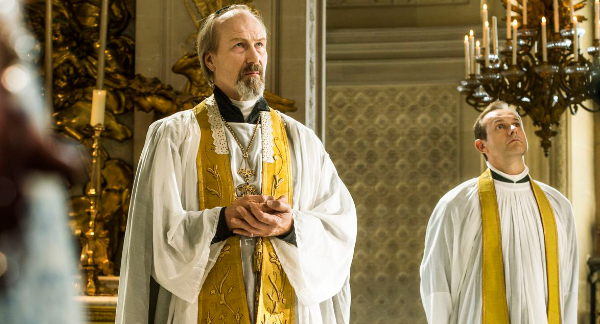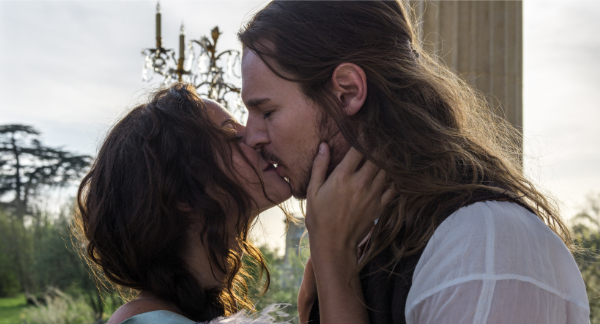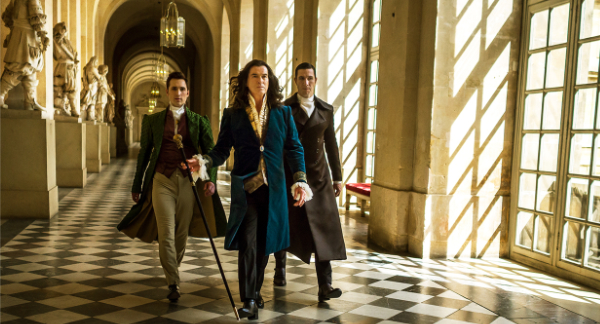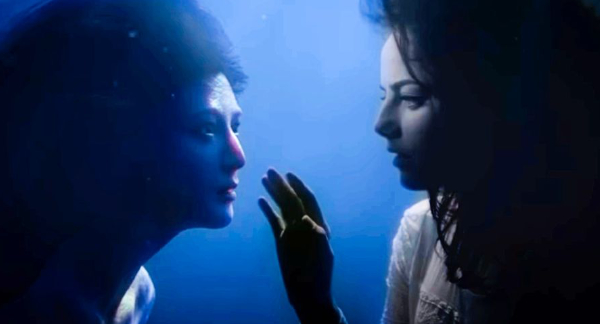With rich tones and lush settings within the Palace and grounds of Versailles, The King’s Daughter presents an intriguing action-adventure fantasy story that includes a touch of romance and swashbuckling excitement. Based on the book The Moon and the Sun, a sci-fi historical romance by Vonda McIntyre and adapted for the screen by Barry Berman and James Schamus, this fantasy film is directed by Sean McNamara, best known for Soul Surfer and The Miracle Season.
Though a somewhat complicated plot, the story unfolds with Pierce Brosnan as King Louis XIV of France whose own daughter was hidden away at a convent since birth. When she comes of age, she is sent to the king’s court at the request of Father Francoise La Chaise (William Hurt), a confidant and confessor to the King. Marie-Josephe (Kaya Scodelario) creates so much chaos in the convent that the Abbess (Rachel Griffiths) is greatly relieved when she leaves. Although the sharp-tongued Abbess is meant to offer a bit of comedy to the film about nun life, her nasty comments about Marie-Josephe and calling Versailles, “a lavish and glimmering hell” leaves her authenticity as a religious Sister questionable. Take it from me, nuns don’t talk like that in real life.
The King, encountering a close call with a would-be assassin, begins to fear death (I think he forgot about the Catholic religious practice of memento mori). He desires immorality. Even though the nuns are not presented so accurately, the priest Fr Francoise comes across as pastorally attentive, even though the confession scenes with the King are incomplete. He continuously warns the King that he has an immortal soul that will live on past death—in heaven if his deeds are good. Father Francoise is the voice of conscience in this whole story and offers the correct understanding of life and death from a Catholic point of view. The opposite is the King’s other advisor, Doctor Labarthe (Pablo Schreiber), who justifies the sacrifice of the creature for the King’s immortality, supposedly based on science. In a world where everyone talks about “following the science,” well, guess what, science is not absolute, as Fr Francoise says so aptly.

In his desire for immortality, the King orders his sailors, under the direction of Captain Yves De La Croix (Benjamin Walker), to go out to sea and capture the mythic mermaid whose heart of light can give the King immortality at the next lunar eclipse. They capture her and enclose her in a dungeon pool.
Marie Josephe plays a cello in her chambers while the strings vibrate from a voice deep in the palace. She discovers the mermaid and strikes a friendship, a kindred spirit relationship. She believes the King will use the mermaid to heal the common people of their ailments, which she does when Marie Josephe breaks her arm riding. Instead, she discovers the King’s true intentions and tries to save the mermaid from those who want to kill her. She receives help from Captain Yves. They fall in love and desire to run away together.

The King is ultimately conflicted since he recognizes that he’s been a selfish man by keeping his daughter locked away in a convent. He says, “I’ve cared about France more than you.” Yet, he doesn’t seem to really change since he’s determined to live forever in this world and pursues the killing of the mermaid at the eclipse while making Marie Josephe marry the arrogant Jean-Michel Lintillac (Ben Lloyd-Hughes) against her wishes.

At one point when the King considers evil actions, Fr Francoise says, “The only thing God gives you that’s immortal is your soul—and you only have one of those!” Harshly critiquing Doctor Labarthe’s pursuit of the King’s immortality, Fr Francoise responds, “Only God can give immortality!” He continues, “By murdering an intelligent being in his name you are condemning the King to eternal damnation!” He exhorts the King, “Do not confuse divine right with divine guidance.” Although the King has his authority from God, it does not give him authority to do whatever he wants. We all follow a natural law that is based on divine law to know what is good and what is evil—a good and often forgotten lesson in many children’s stories. This one is an exception!

Throughout the adventure, everyone must make decisions based on right and wrong. They struggle with their own selfishness, but happiness ultimately comes when goodness, love, and justice rule the day. And though death in this world is inevitable, we can live each moment with conviction for truth and beauty, always keeping our gaze on the world to come which depends on how we live the now. The adventure, romance, and beautiful cinematography of this film allow it to speak to the imaginations of young and old alike and hopefully remind us all about memento mori (remember your death) so as to live our mortal, earthly life in such a way as to merit an immortality of heavenly bliss.
Photos credit: © 2022 Universal Studios Home Entertainment
About the Author

Sr. Nancy is the Director of the Pauline Center for Media Studies and a Media Literacy Education Specialist. She has degrees in Communications Arts and a Masters in Theology and the Arts from Fuller Theological Seminary. She has extensive experience in the creative aspects of social media, print media, radio and video production as well as in marketing, advertising, retail management and administration.
Sr. Nancy has given numerous media mindfulness workshops, presentations and film retreats around the country to youth, young adults, catechists, seminarians, teachers and media professionals helping to create that dialogue between faith and media. She is a member of NAMLE (National Association of Media Literacy Educators), SIGNIS (World Catholic Association for Communicators) and THEOCOM (Theology and Communications in Dialogue) and board member of CIMA (Catholics in Media Associates). She is the author of a theology of popular culture called, A Sacred Look: Becoming Cultural Mystics from Wipf & Stock Publishing. Sr. Nancy is a theologian, national speaker, blogger and film reviewer.